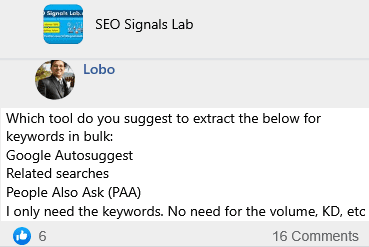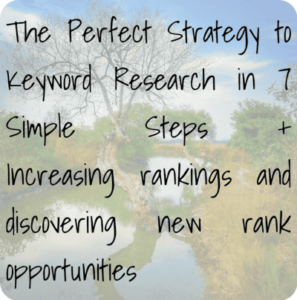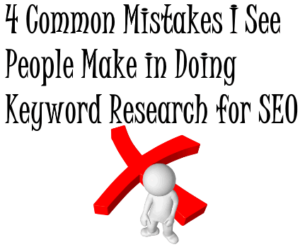Lobo
Which tool do you suggest to extract the below for keywords in bulk:
Google Autosuggest
Related searches
People Also Ask (PAA)
I only need the keywords. No need for the volume, KD, etc
📰👈
6 👍🏽6 16 💬🗨
Truslow
I haven't used most of the tools suggested here, but there is one thing to keep in mind… it's not so important in terms of which tools to use but it's a fairly important concept to keep clear in your head.
Related Searches, PAAs, and all of those enhanced listing type things… exactly none of them are triggered by "keywords". They are triggered by entity identification and by Rank Brain taking that and trying to establish intent or give you options that will help you refine or broaden your search in case what's on the page isn't right and you need to adjust.
Yes, entities can sometimes end up looking like keywords, but they aren't really. For example, if I am searching for a "hero sandwich" it's actually keying in on the entity of "submarine sandwich." It then looks at the submarine sandwich entity which has an attribute that says, "also called hero" and "also called grinder" and "also called sub" and so on. The results you see might still favor the keyword because those different names for the same thing are regionally affected, but the main entity, no matter what variation name you're entering is always going to be "submarine sandwich".
To test this… just type hero sandwich into Google and look at the knowledge panel that appears.
It's important to keep in mind because something like "grinder" – what we call those sandwiches here in Southern New England – probably has a much lower search volume than submarine or even hero. But if someone searches for "hero sandwich" and they happen to be in this part of the country, the "grinder" based results are going to show up because Google knows that they're basically the same thing – it's just the part of the country or world that changes. And thus, my "keyword" of "grinder" may look like a very low volume, low competition keyword in many tools – but it may generate huge amounts of traffic and search volume compared to the others if my web site is in the right part of the country.
The main point of all this in terms of your question… those tools can't be all that accurate in knowing exactly what the actual "entity" is which triggered the enhanced results. It can know that "hero" was typed in the box, but they can't go that extra step to know that "submarine" is the actual keyword that connects everything based upon regional language differences and other factors.
They are tools that can help you get an idea on where to start and how you're doing – but you still need to get in there and manually study results and search term variations in order to see what's really going on there.
I haven't used most of the tools suggested here, but there is one thing to keep in mind… it's not so important in terms of which tools to use but it's a fairly important concept to keep clear in your head.
Related Searches, PAAs, and all of those enhanced listing type things… exactly none of them are triggered by "keywords". They are triggered by entity identification and by Rank Brain taking that and trying to establish intent or give you options that will help you refine or broaden your search in case what's on the page isn't right and you need to adjust.
Yes, entities can sometimes end up looking like keywords, but they aren't really. For example, if I am searching for a "hero sandwich" it's actually keying in on the entity of "submarine sandwich." It then looks at the submarine sandwich entity which has an attribute that says, "also called hero" and "also called grinder" and "also called sub" and so on. The results you see might still favor the keyword because those different names for the same thing are regionally affected, but the main entity, no matter what variation name you're entering is always going to be "submarine sandwich".
To test this… just type hero sandwich into Google and look at the knowledge panel that appears.
It's important to keep in mind because something like "grinder" – what we call those sandwiches here in Southern New England – probably has a much lower search volume than submarine or even hero. But if someone searches for "hero sandwich" and they happen to be in this part of the country, the "grinder" based results are going to show up because Google knows that they're basically the same thing – it's just the part of the country or world that changes. And thus, my "keyword" of "grinder" may look like a very low volume, low competition keyword in many tools – but it may generate huge amounts of traffic and search volume compared to the others if my web site is in the right part of the country.
The main point of all this in terms of your question… those tools can't be all that accurate in knowing exactly what the actual "entity" is which triggered the enhanced results. It can know that "hero" was typed in the box, but they can't go that extra step to know that "submarine" is the actual keyword that connects everything based upon regional language differences and other factors.
They are tools that can help you get an idea on where to start and how you're doing – but you still need to get in there and manually study results and search term variations in order to see what's really going on there.
Marian » Truslow
Same PAA in different keywords mean they are related, even though those keywords have different entities in them?
Would it be a good starting point to analyze a topic?
Truslow
I always start that way. In fact, after I wrote the above thing this morning, I took a closer look at my sandwich example just to see how Google was handling things now. It was a little different than the last time I looked at it. (Keep in mind that because hero/grinder/sub etc are regional terms – you may not see things from your search location exactly how I see them).
I noticed that if I typed in Submarine Sandwich… I got a bunch of pages optimized for that specific keyword and because of my location, Grinders were factored in. But the rich entities favored "Grinders" and "Subway Sandwich Brand" things. (Subway is big and has a big SEO budget). That's mainly because of the regional slang too.
It got interesting, though, when I searched for "hero" sandwich. Presumably, since that's not the entity name and it's not the local term we use for the sandwich around here – most of my results in organic search were for things optimized "submarine sandwich." It determined that if I'm calling it by that name and it's not what we call that sandwich – it wants to give me information about the sandwich – not actually try to sell me a sandwich.
So this lead me to the strategy that if I REALLY wanted to rank nationally for the term (though I expect most sandwich shops have no real need or desire to actually do that), I'd better make sure I'm using the entity name and then semantically connect that to the localized name. If I'm really just trying to sell sandwiches in my area – the localized name and the entity name seem to do equally as well ranking-wise. (Though I might contend click through rates might vary so I'd want to study that a bit over time).
To get back to your specific question… yeah, definitely. You want to study the Search Engine Result Pages (SERPs) in your niche closely and see how Google is interpreting things – both through your researched keywords but also in what Google is doing with those words (and related words). It's also important to take a look at how Google is trying to guide the search process. With a certain term, you may see results, but they aren't quite what you would be looking for. At this point, it's because Google isn't sure what you're looking for and they're going to offer up some alternatives in the form of "People Also Ask" or "See Results about…" or similar type things. So, it can be important to see where Google is trying to guide people through the search process and find where you can most effectively and efficiently fit yourself into that.
We think of "funnels" and things like that on our web sites, but more and more often (especially for established terms with a well established knowledge graph) is creating funnels and conversion paths within the search results themselves.
Understanding that and where Google is trying to push people let's you know where to try to position yourself so Google pushes them right to you. And there currently aren't any tools that can even begin to do that.
Same PAA in different keywords mean they are related, even though those keywords have different entities in them?
Would it be a good starting point to analyze a topic?
Truslow
I always start that way. In fact, after I wrote the above thing this morning, I took a closer look at my sandwich example just to see how Google was handling things now. It was a little different than the last time I looked at it. (Keep in mind that because hero/grinder/sub etc are regional terms – you may not see things from your search location exactly how I see them).
I noticed that if I typed in Submarine Sandwich… I got a bunch of pages optimized for that specific keyword and because of my location, Grinders were factored in. But the rich entities favored "Grinders" and "Subway Sandwich Brand" things. (Subway is big and has a big SEO budget). That's mainly because of the regional slang too.
It got interesting, though, when I searched for "hero" sandwich. Presumably, since that's not the entity name and it's not the local term we use for the sandwich around here – most of my results in organic search were for things optimized "submarine sandwich." It determined that if I'm calling it by that name and it's not what we call that sandwich – it wants to give me information about the sandwich – not actually try to sell me a sandwich.
So this lead me to the strategy that if I REALLY wanted to rank nationally for the term (though I expect most sandwich shops have no real need or desire to actually do that), I'd better make sure I'm using the entity name and then semantically connect that to the localized name. If I'm really just trying to sell sandwiches in my area – the localized name and the entity name seem to do equally as well ranking-wise. (Though I might contend click through rates might vary so I'd want to study that a bit over time).
To get back to your specific question… yeah, definitely. You want to study the Search Engine Result Pages (SERPs) in your niche closely and see how Google is interpreting things – both through your researched keywords but also in what Google is doing with those words (and related words). It's also important to take a look at how Google is trying to guide the search process. With a certain term, you may see results, but they aren't quite what you would be looking for. At this point, it's because Google isn't sure what you're looking for and they're going to offer up some alternatives in the form of "People Also Ask" or "See Results about…" or similar type things. So, it can be important to see where Google is trying to guide people through the search process and find where you can most effectively and efficiently fit yourself into that.
We think of "funnels" and things like that on our web sites, but more and more often (especially for established terms with a well established knowledge graph) is creating funnels and conversion paths within the search results themselves.
Understanding that and where Google is trying to push people let's you know where to try to position yourself so Google pushes them right to you. And there currently aren't any tools that can even begin to do that.
📰👈
3 Steps to get a Snippet on the Google SERP
How to Delete Hacked Urls From Google SERPs? A New Owner Has Been Added on GSC
Embed the link of this post







